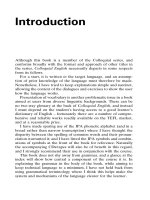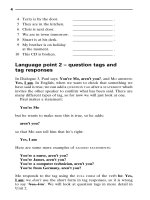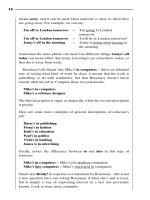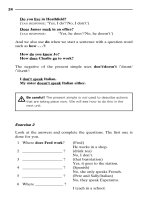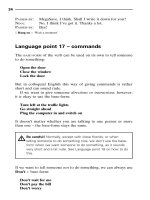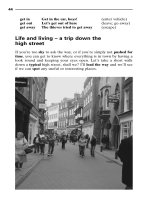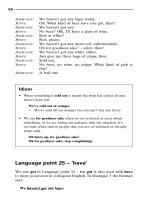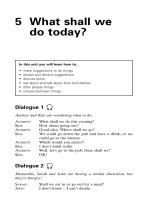Tài liệu A complete English language course part 12 ppt
Bạn đang xem bản rút gọn của tài liệu. Xem và tải ngay bản đầy đủ của tài liệu tại đây (113.67 KB, 10 trang )
Dialogue 5
Damian’s short of money – he needs a job that’ll fit in with school.
He calls at the newsagent’s, where they’re advertising for someone to
deliver papers in the mornings.
D
AMIAN
: I’m interested in the delivery job.
N
EWSAGENT
: OK. May I
1
ask you a few questions to see if you’re
suitable for the job?
D
AMIAN
: Of course – fire away!
N
EWSAGENT
: Right – first and foremost: are you good at getting
up early?
D
AMIAN
: Oh yes.
N
EWSAGENT
: Good. And are you afraid of the dark?
D
AMIAN
: Not at all.
N
EWSAGENT
: Excellent. Are you used to riding a bike?
D
AMIAN
: I ride my bike all the time.
N
EWSAGENT
: Good. And are you prepared to work on Sundays as
well?
2
D
AMIAN
: Of course. I need the money.
N
EWSAGENT
: Fine. And one final question: are you good with
animals?
D
AMIAN
: Good with animals? Why are you worried about
that?
N
EWSAGENT
: Because some of our customers have vicious dogs.
D
AMIAN
: Look, I’m going to think it over for a bit. Can I get
back to you later?
N
EWSAGENT
: OK. Don’t put it off too long, though, or someone
will get in before you.
1 May I . . .? (+
BASE
-
FORM
) is a more formal way of asking permission to do some-
thing.
2 as well = ‘also’
94
Idioms
• Fire away! means ‘Go ahead and ask the questions’
• First and foremost means ‘first of all’
Language point 40 – adjectives with
prepositions
Some adjectives are used with
PREPOSITION
s – you have to learn
these uses individually. For example, in Dialogue 5 we see:
interested in
the job
and suitable for
the job
Sometimes the same adjective is used with different prepositions
depending on what type of word follows:
good with
animals (noun)
good at
getting up early (
ING
-
FORM
of the verb)
ready for
dinner (noun)
ready to
go out (
BASE
-
FORM
of the verb)
Sometimes two adjectives use the same preposition, but different
forms of the verb:
prepared to work
used to working
Good learners’ dictionaries will always tell you this information for
any adjective. Try making separate lists of your own to help you
learn them. For example, you could make your own list of adjec-
tives that are followed by to, and add to it as you come across new
examples. Grammar books of English also often provide lists of
adjectives in this way.
A lot of adjectives describing personal feelings are used with
prepositions, such as afraid of
the dark in the Dialogue. Here are
some others:
surprised at
proud of
keen on
bored with
scared of disappointed with/about
ashamed of
worried about
Usually these adjectives + prepositions are followed by a
NOUN
:
I’m disappointed about the result
Gerry’s proud of his work
My sister is worried about money
1111
2
3
4
5
6
7
8
9
10
11
1211
13
14
15
16
17
18
19
20
21
22
23
24
25
26
27
28
29
30
31
32
33
34
35
36
37
38
39
40
41
4211
95
but they can often also be followed by the
ING
-
FORM
of the verb:
I’m disappointed about coming last
Gerry’s proud of learning Spanish
My sister’s worried about missing the plane
Exercise 7
Complete these sentences using in, about, with, to, for, on, of or at.
Use a dictionary if you need to.
1 Are you ready ___ another question?
2 You look bored ___ all that paperwork.
3 Are you interested ___ coming along with us?
4 This bag is full ___ doughnuts.
5 I’m angry ___ Stuart – he’s throwing chocolates at me.
6 Is Satoko good ___ speaking English?
7 Are the children ready ___ leave yet?
8 You have to be good ___ animals to work in a zoo.
9 We’re rather worried ___ Henry.
10 Gerry’s very keen ___ biscuits, isn’t he?
Exercise 8
Match the first half of the sentences on the left with the second
halves on the right. The first one has been done for you.
1 The team was amazed a with people
2 Rosemary is terribly scared b for the main course yet
3 I’m so fed up c with the exam result
4 We were shocked d by the score last week
5 The room was crowded e with this job
6 We’re not ready f at the terrible news
7 I’m disappointed g in applying for that job
8 I hear Nigel’s interested h of big spiders
Phrasal verbs
fit in (with) – Does this fit in with you? means ‘Does this coincide with
what you’ve already arranged?’.
get back (to) – I’ll get back to you means ‘I’ll contact you again soon’.
96
get through (to) – ‘succeed in contacting’; I got through to him in the end
means that I finally managed to speak to him on the phone.
go on (at) – when someone goes on at you, it means that they keep
complaining to you or telling you something until you agree. Stop
going on at me! means something like ‘Stop talking – I don’t want to
listen!’.
put off – ‘postpone’; ‘change an arrangement ‘so that it happens later.
Don’t put it off means ‘Do it now – don’t delay.’
ring back – ‘return a phone call’.
switch off is what we do to lights and machines when we want them to
stop working – we use the off
switch. (We also say turn off to mean the
same thing).
switch on is what we do to lights and machines when we want them to
start working – we use the on
switch. (We also say turn on to mean the
same thing).
think over – when we think something over (not ‘think over something
’),
we spend some time thinking carefully about it. If you make a
suggestion to someone, and they say to you I’ll think it over, it
means that you will have to wait and come back to them later for
an answer.
1111
2
3
4
5
6
7
8
9
10
11
1211
13
14
15
16
17
18
19
20
21
22
23
24
25
26
27
28
29
30
31
32
33
34
35
36
37
38
39
40
41
4211
97
7 What date is
it today?
In this unit you will learn how to:
• talk about the future
• tell someone what you plan or intend to do
• talk about necessity and having to do things
• use state verbs
Dialogue 1
James and Henry are talking about the Bank Holiday – James hasn’t
thought everything through.
J
AMES
: What are you doing over the Bank Holiday,
1
Henry?
H
ENRY
: I’m going to do up the house – we’re selling it next
year. What about you and Fiona?
J
AMES
: We’re going to hire a car and go down to Cornwall.
H
ENRY
: That’ll be fun. What are you going to do there?
J
AMES
: I’m going to try and do some surfing – if the weather’s
OK. And Fiona’s going to visit her sister.
H
ENRY
: Will you be back by Tuesday?
J
AMES
: Fiona will, but I’m taking an extra day off work, so
I’m not driving back till Tuesday.
H
ENRY
: How’s Fiona getting home, then?
J
AMES
: Good question – I’ll ask her.
1 Bank Holiday – a public holiday in the UK when banks, schools and public offices
are closed. See Life and living – holidays at the end of Unit 11 for more informa-
tion about this and other holidays.

